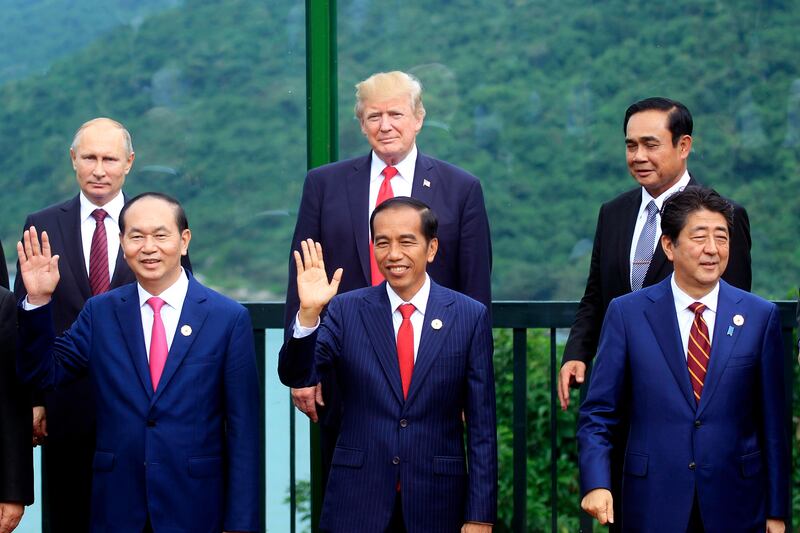Donald Trump stamped his “America first” message on a summit of Apec leaders in Vietnam on Saturday, winning concessions in a joint statement that criticised the World Trade Organisation and talked up bilateral deals in contrast to previous years.
The communique, endorsed by the 21 nations of the Asia-Pacific Economic Cooperation forum, came after the American president said the United States would not join broad trade agreements that ate into its sovereignty.
The compromise showed the pull Mr Trump enjoys in a part of the world that looks to America to balance Chinese ambition and came as Pacific Rim nations pressed ahead with the Trans-Pacific Partnership without the US.
Mr Trump was attending the Apec summit in Danang, Vietnam, during his five-nation tour of Asia.
During an address to chief executives at the meeting, he said the US would pursue one-on-one deals with countries that promise fair and reciprocal trade.
“We are not going to let the United States be taken advantage of any more,” he said. “I am always going to put America first, the same way that I expect all of you in this room to put your countries first.”
And after his warm words for the Chinese president in Beijing, he sought to reassure his audience that he had been tough in private meetings with Xi Jinping.
He promised to uphold freedom of navigation and overflight as well as to protect against territorial expansion, a frequent complaint against China in the South China Sea.
It marked a change in tone from Mr Trump’s use of flattery in Beijing, where he was feted with marching bands and a state dinner.
The Apec joint statement suggested he and his officials had managed to get their message across.
The leaders agreed on the need to reform the World Trade Organisation’s monitoring and dispute functions – a rare criticism of the body that regulates international trade.
“We will work together to make trade more inclusive, support improved market access opportunities, and address unfair trade practices,” said the statement issued by the 21-nation bloc.
“We urgently call for the removal of market-distorting subsidies and other types of support by governments and related entities.”
It also noted the importance of “bilateral, regional and plurilateral agreements”, an apparent nod to Mr Trump’s preference for country by country deals, rather than broad multilateral deals. Last year’s statement made no reference to bilateral agreements.
However, the American president did not have it all his own way.
Trade ministers from the 11 nations remaining in the Trans-Pacific Partnership announced they had reached agreement to press on with the free-trade pact, which had faced collapse when Mr Trump announced the US would not take part.
“The substance is something all the TPP countries can agree on,” said Toshimitsu Motegi, Japanese trade minister. “This will send a very strong message to the US and the other countries in the region.”
The announcement was delayed by last-minute disagreements and the absence of Justin Trudeau, the Canadian prime minister who said more work needed to be done.
However, their progress highlights how Mr Trump’s protectionist instincts risk isolating the US on the world stage.
Even without the US, the deal – now called the Comprehensive and Progressive Agreement for Trans-Pacific Partnership – would cover almost a sixth of global trade.
Mr Trump also spoke informally to Vladimir Putin during the summit.
“You can only ask so many times ... he said he absolutely did not meddle in our election," said Mr Trump, adding that the believed the Russian president’s denials despite the conclusions of US intelligence agencies that Moscow sought to influence the outcome.
He told reporters aboard Air Force One that Mr Putin felt “insulted” by the allegations, which are currently the focus of a federal investigation.
Mr Trump arrived in the Vietnamese capital Hanoi on Saturday night. He flies to the Philippines, the final destination on his trip, on Sunday.
_______________
Read more:
[ Trump and Xi lay out competing trade visions at Apec ]
[ Russian involvement in Brexit vote revealed by Twitter data analysis ]
[ Watch: The Week That Was with Tim Marshall ]
_______________






